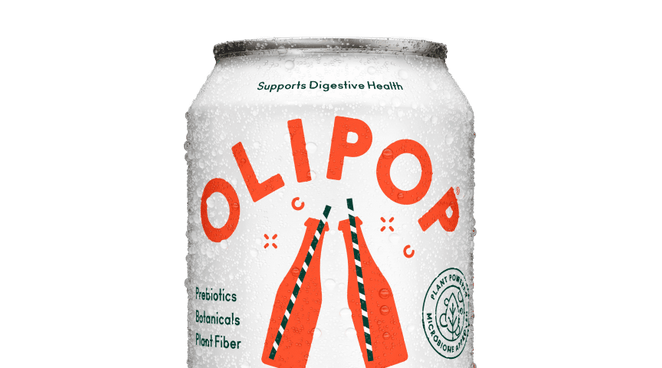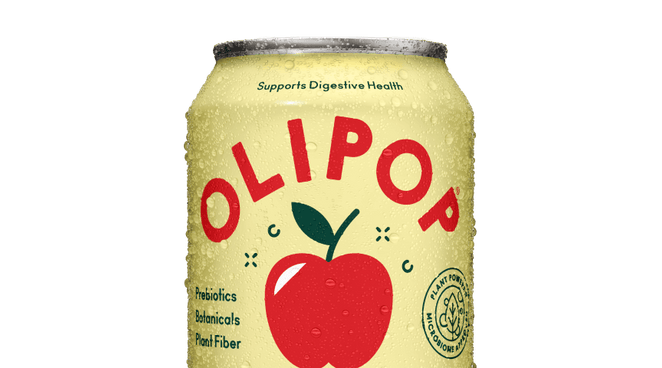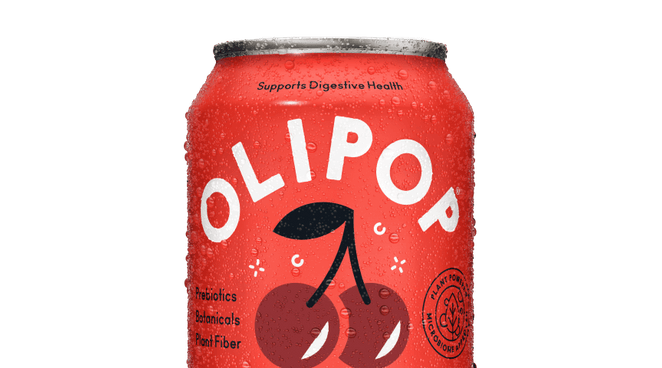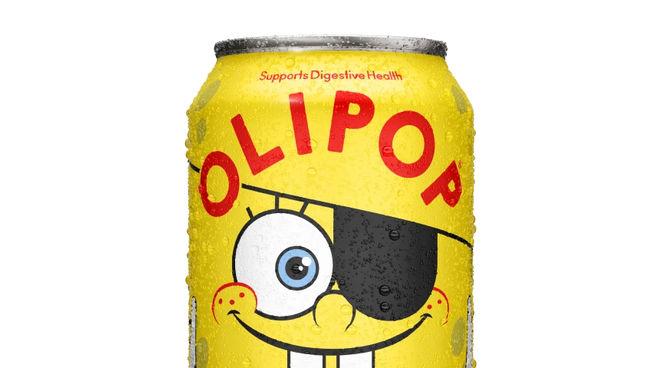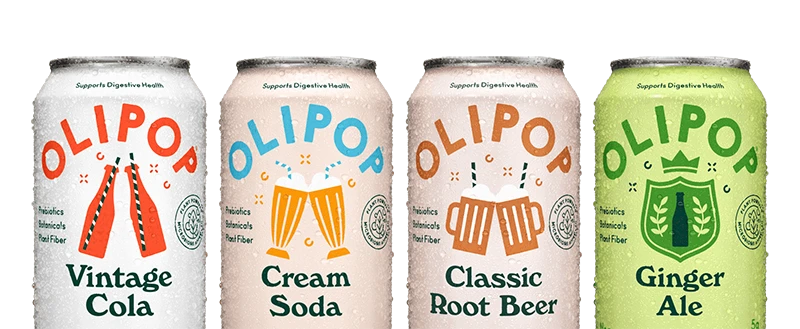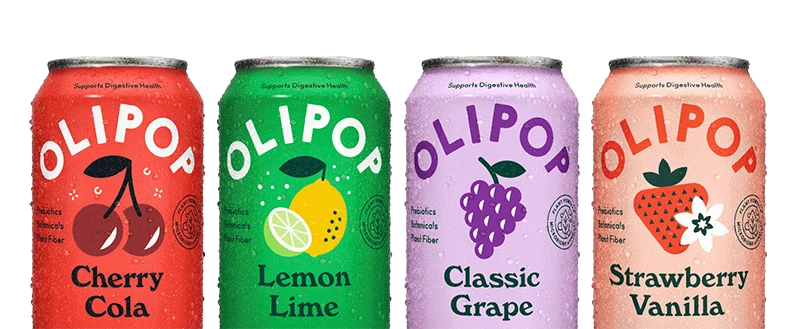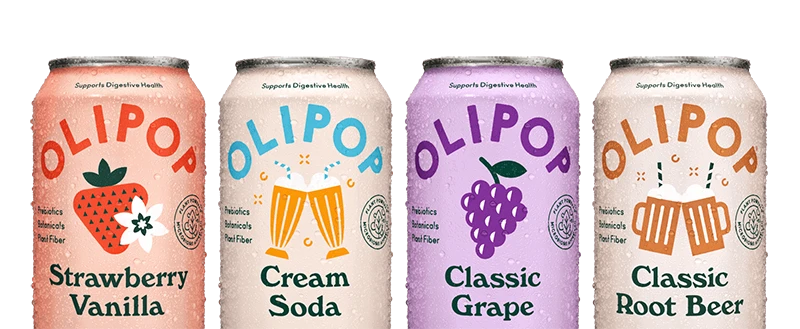Let’s set the record straight with two commonly confused terms: probiotics and prebiotics. Probiotics are live microorganisms (often called “good” bacteria) that can support your body’s natural systems, including digestive health. Prebiotics, on the other hand, aren’t bacteria. They’re specific types of dietary fiber that serve as fuel for those beneficial bacteria living in your gut. Think of them as the nourishment your microbes need to survive.
So, where does OLIPOP fit into the picture? Each serving of OLIPOP contains between 6 to 9 grams of prebiotic fiber. That means we’re here to feed the good bacteria you already have so they can do their best work.
Let’s break it down and get to the gut of it all.
What are Prebiotics?
Prebiotics are non-digestible food ingredients that stimulate the growth and activity of beneficial bacteria in your gut and have a known health benefit. [1] Think of them as compost for your inner garden, feeding the flora that helps keep things thriving below the surface.
Want to learn more? Dive deeper into the world of prebiotics in our prebiotic deep dive blog.
Prebiotic Benefits
Turns out, being the compost for your inner garden comes with some perks. Here are a few ways in general that prebiotics can support your health:
-
Support a thriving gut ecosystem by increasing the number of beneficial bacteria in your gut. [2]
-
Fuel the production of short-chain fatty acids (SCFAs), which help maintain a healthy gut environment. [3]
- Play a role in digestion, nutrient absorption, and satiety (aka fullness). [3]
- Promote a favorable impact on blood sugar thanks to soluble prebiotic fibers like guar gum, inulin, and resistant dextrin. [4]
Where to Find Prebiotics
You’ll find prebiotics in plenty of plant-based foods and drinks, including these sources:
- Vegetables: Asparagus, artichoke, garlic, onions, peas, chicory root
- Fruits: Green or unripe bananas, apples, pears, berries
- Grains & legumes: Wheat bran, oats, barley, chia seeds, flaxseeds, lentils, chickpeas
- Drinks: OLIPOP (we’ve got 6 to 9g of prebiotic fiber in every serving)
Psst.. Want to learn more about the types of prebiotic fiber we have in our formula? Head to our prebiotic fiber blog for more!
What are Probiotics?
Probiotics are “good” bacterial strains that live in certain parts of your body (like your gut) and help support various aspects of your health. And just like any living organism, they need the right environment and fuel (hint: prebiotics!) to thrive.
Probiotic Benefits
Having the right balance of “good” bacteria, AKA probiotics, may help support your health in a variety of ways. Here are some of the ways that probiotics can help:
- Support digestive balance by helping maintain a diverse gut microbiome and assisting with the breakdown of certain foods. [5]
- Support immune health by interacting with the gut’s immune cells and helping reinforce your body’s natural defenses. [6]
- Aid in nutrient absorption and tolerance, with certain strains helping your body process foods like lactose and other nutrients more efficiently. [6]
- Supports a healthy gut lining and may contribute to a balanced inflammatory response. [6]
Where to Find Probiotics
If you’ve stocked your fridge with tangy, fermented goodies, chances are you’re already feeding your probiotic side. You can find those friendly microbes in foods like yogurt, kefir, kimchi, kombucha, and more.
Just be sure to check the label and look for the phrase "contains live and active cultures" and to check for specific bacteria strains in the ingredient list to confirm that your yogurt, kefir, and fermented foods contain the probiotics you’re looking for.
Does OLIPOP Have Prebiotics or Probiotics?
Prebiotics! Every can of OLIPOP is formulated with a blend of functional ingredients, including prebiotic fibers like inulin, resistant dextrin, acacia, and guar fiber. These fibers help feed the probiotics you already have in your gut, so they can support a balanced internal ecosystem.
With a whopping 6 to 9 grams of prebiotic fiber per serving, cracking open a can of OLIPOP helps support your digestive health. Feel free to combine your sipping with a diet rich in fermented foods or foods with added probiotics!
Prebiotics vs. Probiotics: The Takeaway
You need both prebiotics and probiotics to support digestive health, and OLIPOP has your back on the prebiotic side.
While probiotics are the beneficial bacteria that support your gut, prebiotics are the fuel that keeps those bacteria going strong. By sipping an OLIPOP, you’re giving your body a delicious, low sugar* beverage that provides an excellent source of fiber to support your digestive health... one 12oz can at a time.
*Contains at least 80% less sugar than leading, non-diet sodas (3-5 g per can vs 32-46g)."
Sources:
- Prebiotics. (n.d.). International Scientific Association for Probiotics and Prebiotics (ISAPP). https://isappscience.org/topic/prebiotics/
- Sarao, L. K., & Arora, M. (2015). Probiotics, prebiotics, and microencapsulation: A review. Critical Reviews in Food Science and Nutrition, 57(2), 344–371. https://doi.org/10.1080/10408398.2014.887055
- Blaak, E., Canfora, E., Theis, S., Frost, G., Groen, A., Mithieux, G., Nauta, A., Scott, K., Stahl, B., Van Harsselaar, J., Van Tol, R., Vaughan, E., & Verbeke, K. (2020). Short chain fatty acids in human gut and metabolic health. Beneficial Microbes, 11(5), 411–455. https://doi.org/10.3920/bm2020.0057
- Giuntini, E. B., Sardá, F. a. H., & De Menezes, E. W. (2022). The effects of soluble dietary fibers on glycemic Response: An Overview and Futures Perspectives. Foods, 11(23), 3934. https://doi.org/10.3390/foods11233934
- Effects Of Probiotics And Prebiotics On Our Microbiota. (2025, October 2). International Scientific Association for Probiotics and Prebiotics (ISAPP). https://isappscience.org/resource/effects-of-probiotics-and-prebiotics-on-our-microbiota/
- Kechagia, M., Basoulis, D., Konstantopoulou, S., Dimitriadi, D., Gyftopoulou, K., Skarmoutsou, N., & Fakiri, E. M. (2013). Health benefits of Probiotics: A review. ISRN Nutrition, 2013, 1–7. https://pmc.ncbi.nlm.nih.gov/articles/PMC4045285/
- Probiotics are “good” bacteria strains that live in certain parts of your body (like your gut) and help support various factors of your health.
- Prebiotics are a type of fiber that feed these good bacteria living in your gut.
- OLIPOP contains a blend of prebiotic fibers and functional ingredients.

